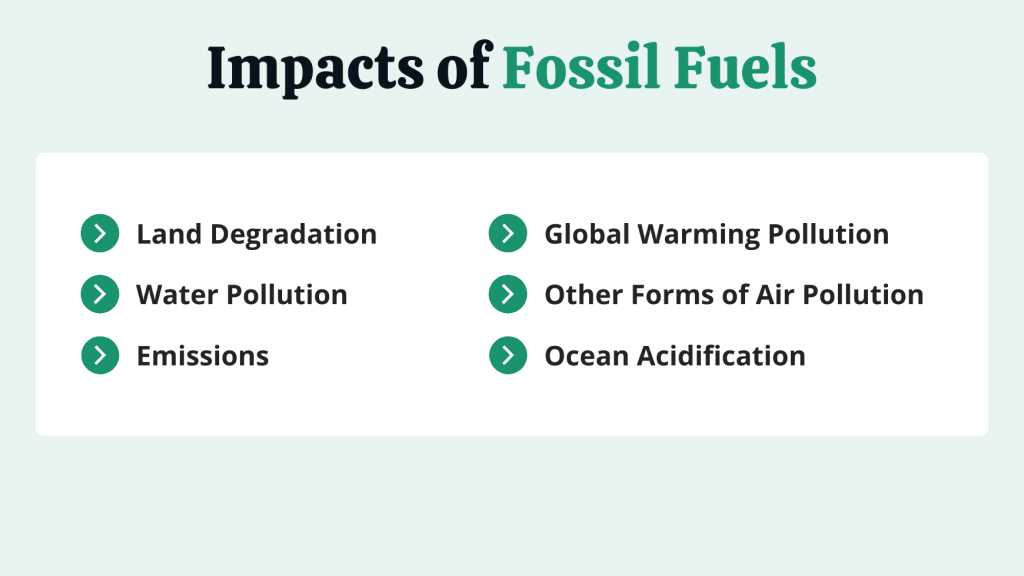
Welcome to our article on the importance of fossil fuels and their impact on our environment. Fossil fuels have played a significant role in shaping modern life, providing us with the energy we need to power our homes, fuel our transportation, and drive our industries. However, as we rely heavily on fossil fuels, we cannot ignore the negative consequences they have on our environment.
Fossil fuels, including coal, oil, and natural gas, are formed over millions of years from organic material buried deep within the Earth. These energy sources have been readily available and have helped fuel the progress and development we see today. However, the burning of fossil fuels releases large amounts of carbon dioxide and other greenhouse gases, contributing to global warming and climate change.
Not only do fossil fuels produce harmful emissions, but their extraction also poses serious environmental risks. The process of mining coal, drilling for oil, and extracting natural gas can damage ecosystems, contaminating water sources and disrupting wildlife habitats. These activities threaten biodiversity and can have long-lasting effects on the environment.
As we continue to rely on fossil fuels, it is crucial to address their impact on our environment. It is evident that we must transition to cleaner and renewable sources of energy to mitigate the ecological challenges posed by fossil fuels. By reducing our dependence on fossil fuels and embracing sustainable alternatives, we can protect our environment for future generations and work towards a greener and more sustainable future.
In the following sections of this article, we will explore in more detail what fossil fuels are, their role in modern life, their environmental impact, and the need for a transition to cleaner energy sources.
What Are Fossil Fuels?
In this section, we will explore the definition and composition of fossil fuels. Fossil fuels are energy resources that are formed from the ancient remains of plants and animals. Over millions of years, these organic materials undergo heat and pressure, transforming into substances that we use for energy today.
There are three main types of fossil fuels:
- Coal: This black, combustible rock is primarily composed of carbon. It is the most abundant and widely used fossil fuel, known for its ability to generate electricity and provide heat for industrial processes.
- Oil: Also known as petroleum, oil is a liquid fossil fuel that has a complex mixture of hydrocarbons. It is most commonly used as fuel for transportation and as a raw material for the production of various chemicals and plastics.
- Natural Gas: Composed mainly of methane, natural gas is a colorless and odorless fossil fuel. It is primarily used for heating and cooking in residential and commercial buildings. Additionally, it is an essential fuel source for electricity generation and is increasingly being used as a cleaner alternative to coal and oil.
Fossil fuels are limited resources that are unequally distributed around the world. While some countries possess significant fossil fuel reserves, others rely heavily on imports to meet their energy needs. This global distribution has important geopolitical and economic implications.
As we move forward, let’s now explore the role that fossil fuels play in shaping various aspects of modern life.
The Role of Fossil Fuels in Modern Life

Fossil fuels play a significant role in shaping various aspects of modern life. Their abundant availability and energy density make them indispensable in meeting the demands of transportation, electricity generation, manufacturing, and other industries.
In the transportation sector, fossil fuels, particularly petroleum products, power the majority of vehicles used for personal and commercial purposes. Gasoline and diesel fuels enable the efficient movement of people and goods around the world, providing convenience and accessibility.
Fossil fuels also play a crucial role in electricity generation. Coal-fired power plants, for instance, remain a key source of electricity in many countries. Natural gas is widely used as a cleaner alternative, contributing to reducing greenhouse gas emissions compared to coal. These resources ensure a stable supply of electricity necessary for running homes, businesses, and essential services.
Furthermore, fossil fuels are integral to the manufacturing industry, serving as a vital energy source for industrial processes. They provide the thermal energy required for refining raw materials, powering machinery, and supporting the manufacturing of steel, chemicals, plastics, and more. Cement production, which heavily relies on coal as a fuel, is another example of how fossil fuels enable essential construction materials.
Besides their importance in various sectors, the role of fossil fuels in modern life extends to its economic implications. Many economies heavily depend on the extraction and use of fossil fuels, contributing to job creation, revenue generation, and economic growth. The oil and gas industry, for instance, supports millions of jobs worldwide and drives investment in infrastructure development.
Overall, fossil fuels are deeply ingrained in modern life, providing the energy required to sustain our growing global population. However, it is critical to recognize and address the environmental challenges associated with their use to ensure a sustainable and clean future for generations to come.
Environmental Impact of Fossil Fuels
Fossil fuels have significant environmental ramifications due to their extraction, production, and combustion processes. The extensive use of fossil fuels, such as coal, oil, and natural gas, contributes to various environmental issues.
Emission of Greenhouse Gases
One of the primary environmental impacts of fossil fuels is the emission of greenhouse gases (GHGs) into the atmosphere. When fossil fuels are burned, carbon dioxide (CO2), methane (CH4), and nitrous oxide (N2O) are released, trapping heat and exacerbating the greenhouse effect. This phenomenon leads to global warming and climate change, with severe consequences for ecosystems, weather patterns, and sea levels.
Air Pollution
In addition to GHGs, fossil fuel combustion generates air pollutants that harm air quality and human health. Particulate matter, sulfur dioxide (SO2), nitrogen oxides (NOx), and volatile organic compounds (VOCs) are among the substances released. These pollutants contribute to respiratory diseases, cardiovascular problems, and smog formation, impacting both urban and rural areas.
Contribution to Climate Change
The burning of fossil fuels is a major contributor to climate change. As atmospheric concentrations of GHGs continue to rise, the Earth’s climate system becomes increasingly disrupted. This disruption leads to more frequent and intense heatwaves, droughts, hurricanes, and extreme weather events, posing significant threats to ecosystems, agriculture, and human settlements worldwide.
Impact on Ecosystems and Biodiversity
The extraction of fossil fuels causes significant disruption to ecosystems and biodiversity. Mining for coal and drilling for oil and gas often require deforestation, habitat destruction, and land degradation. These activities result in the loss of biodiversity, endangering plant and animal species. Moreover, oil spills and leaks during extraction and transportation can contaminate water bodies, further harming aquatic ecosystems.
To mitigate the environmental impact of fossil fuels, transitioning to cleaner and renewable energy sources is crucial. Embracing sustainable practices, promoting energy efficiency, and investing in innovative technologies are key steps towards a greener future.
Conclusion
In conclusion, the use of fossil fuels has had a profound impact on our environment. While these energy sources have played a crucial role in shaping modern life, their negative consequences cannot be overlooked. The emission of greenhouse gases and air pollution generated by fossil fuel combustion contribute significantly to climate change and pose a threat to human health and ecosystems.
It is evident that a transition to cleaner and renewable energy sources is imperative to mitigate the environmental damage caused by fossil fuels. Investing in sustainable technologies such as solar, wind, and hydroelectric power can help reduce our carbon footprint and create a more sustainable future. Governments, industries, and individuals alike must work together to accelerate this transition and embrace the opportunities provided by renewable energy.
Ongoing efforts and advancements in renewable energy technologies offer hope for a greener future. Innovations in battery storage, smart grids, and energy efficiency can further enhance the viability and accessibility of these clean energy sources. By reducing our dependence on fossil fuels, we can safeguard the planet for future generations and help combat the effects of climate change.
FAQ
What are fossil fuels?
Fossil fuels are natural resources that are formed from the remains of ancient plants and animals. They include coal, oil, and natural gas and are primarily composed of carbon and hydrogen.
How are fossil fuels formed?
Fossil fuels are formed over millions of years through the decomposition and compression of organic matter buried deep within the Earth’s crust. Heat and pressure transform these organic remains into hydrocarbon-rich substances.
What is the role of fossil fuels in modern life?
Fossil fuels play a significant role in various aspects of modern life. They are used to power vehicles, generate electricity, and provide heat for homes and industries. Fossil fuels are also essential for manufacturing and producing a wide range of products.
What is the environmental impact of fossil fuels?
The use of fossil fuels has a significant environmental impact. Burning fossil fuels releases greenhouse gases, such as carbon dioxide, into the atmosphere, contributing to climate change. Fossil fuel extraction and processing can also lead to air and water pollution, habitat destruction, and the loss of biodiversity.
What can be done to mitigate the negative impact of fossil fuels?
Transitioning to cleaner and renewable energy sources is crucial in reducing the negative impact of fossil fuels. Investing in renewable energy technologies like solar, wind, and hydropower can help decrease greenhouse gas emissions and promote sustainable development. Additionally, energy conservation and adopting more energy-efficient practices can further reduce our dependence on fossil fuels.




